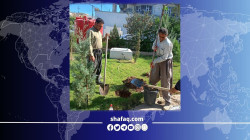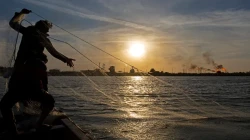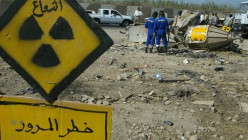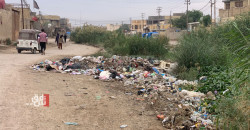Iraq’s environmental disaster: Oil springs flow into river
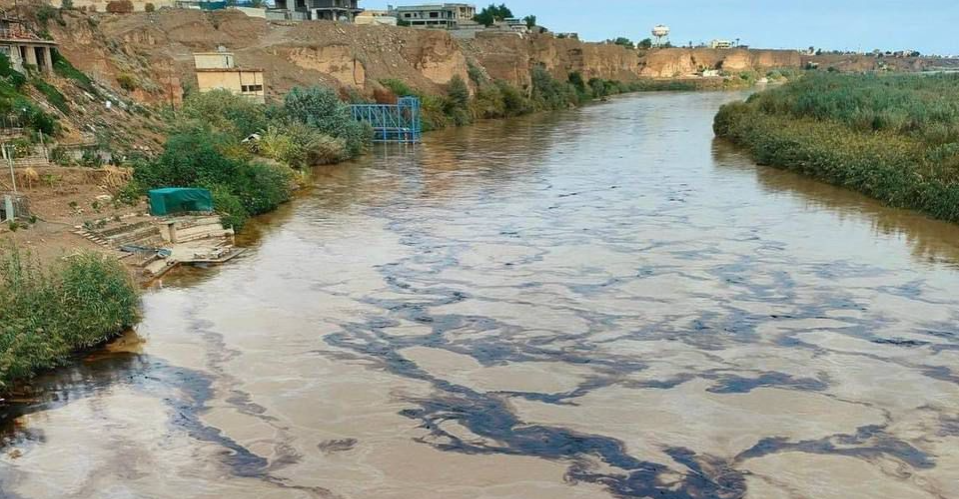
Shafaq News/ A growing environmental crisis is unfolding in Iraq as crude oil seeps into land and rivers, threatening agriculture, livelihoods, and public health. What was once a resource of national pride has now become an invisible menace, slowly poisoning the environment and endangering public health.
Across vast swaths of the country, crude oil seeps into the land and flows into the water, leaving behind a trail of devastation. Fields that once flourished with crops now lie poisoned, and rivers that once nourished entire communities have become contaminated, and the very resources that the people of Iraq depend on for survival are being destroyed, as the toxic oil slowly spreads, threatening agriculture, livelihoods, and the health of millions.
Old Leaks
Near the village of Al-Muslaha, in the Makhoul Mountains in the Baiji district, north of Saladin province, residents described a scene that had become part of their daily lives: black patches spread across the ground, foul odors filled the air, and small rivers of crude oil seeped into the Tigris River.
Mahmoud Al-Qaisi, a retired employee of the Baiji refinery, said, "These oil wells have been here for more than 50 years. No government has moved to exploit them or even study them to determine their nature—whether they are pure crude oil or mixed with sulfur."
Al-Qaisi pointed out that the area held neglected investment potential, with large oil wells that could have been a new source of national wealth, as well as the possibility of turning it into an eco-tourism destination if handled scientifically and thoughtfully. However, the lack of government vision was met with a constant threat to the Tigris River, where oil patches periodically appeared on its surface.
Deteriorating Infrastructure, Heavy Legacy
The former Head of the Kirkuk Environment Department Directorate, Ali Khorsheed, explained to Shafaq News that a significant portion of the oil leaks observed in the Tigris and other areas of Iraq resulted from old pipelines, which sustained extensive damage during the years of conflict with ISIS. These pipelines were also frequently subjected to sabotage and theft, including punctures and illegal oil extraction.
After ISIS seized large parts of Iraq in 2014, they took control of the Ajil and Alas oil fields and used the oil to fund their operations by creating storage tanks. Muhammad Majid, director of the Environment Department in Saladin said that ISIS members detonated pipelines and wells, causing large quantities of oil residues to leak into surrounding areas.
Once security forces regained control of the area in 2017, following the defeat of ISIS, they initiated an operation to bury these tanks, according to Amer Al-Mihiri, head of the Oil Fields Authority in Saladin, in a TV interview. However, with the onset of rains, these oil residues resurfaced, once again threatening the environment and water sources.
Environmental Damage
Despite oil being a national treasure, its random leakage turned black gold into a true curse that threatened public health and destroyed livelihoods. Ali Al-Ubaidi, a resident of the village of Al-Muslaha, revealed to Shafaq News that people witness the death of sheep and birds occasionally due to petroleum and sulfuric substances, confirming that part of this oil seeped into the Tigris River, which was the main water source for people.
The losses had not been confined to livestock, birds, and water but had also extended to agricultural land. Saadoun Abdullah, a farmer from the Makhoul Mountains, told Shafaq News that the lands along the road between Tikrit and Kirkuk had suffered the destruction of hundreds if not thousands, of dunams of farmland due to the flow of oil from the Ajil and Alas fields.
Lack of Vision
Despite the enormity of the problem, security measures were weak, pipelines were deteriorating, and investments were absent in small fields or neglected wells, while provinces suffered from a lack of services and declining development rates.
Environmental and energy experts confirmed that Iraq needed a comprehensive plan that included updating the entire oil pipeline network, implementing smart monitoring systems for early leak detection, enhancing pipeline protection from sabotage, and launching large-scale campaigns to rehabilitate environmentally damaged areas.
Khorsheed affirmed that government responses have often focused on temporary measures, such as building earthen berms or cleaning up pollution patches as they appear, while failing to address the root causes, such as replacing deteriorating pipelines or securing the oil fields and pipelines properly. "The crisis recurs because the underlying issues remain," he stated, noting that although the Kirkuk Environment Directorate had formed joint teams with North Oil Company to monitor oil pollution in the Tigris, their recommendations were never acted upon.
So far, oil leaks remained a persistent crisis in Iraq. While their direct effects may have seemed local or confined to certain areas, pollution in major rivers like the Tigris threatened to spread the damage to other provinces, signaling far-reaching consequences that affected the health of millions of Iraqis and jeopardized food and water security.
In the absence of serious government action, the environmental catastrophe continued to escalate, while calls from residents and experts for urgent intervention and sustainable solutions grew louder to stop the waste and protect what remained of Iraq's natural resources.
